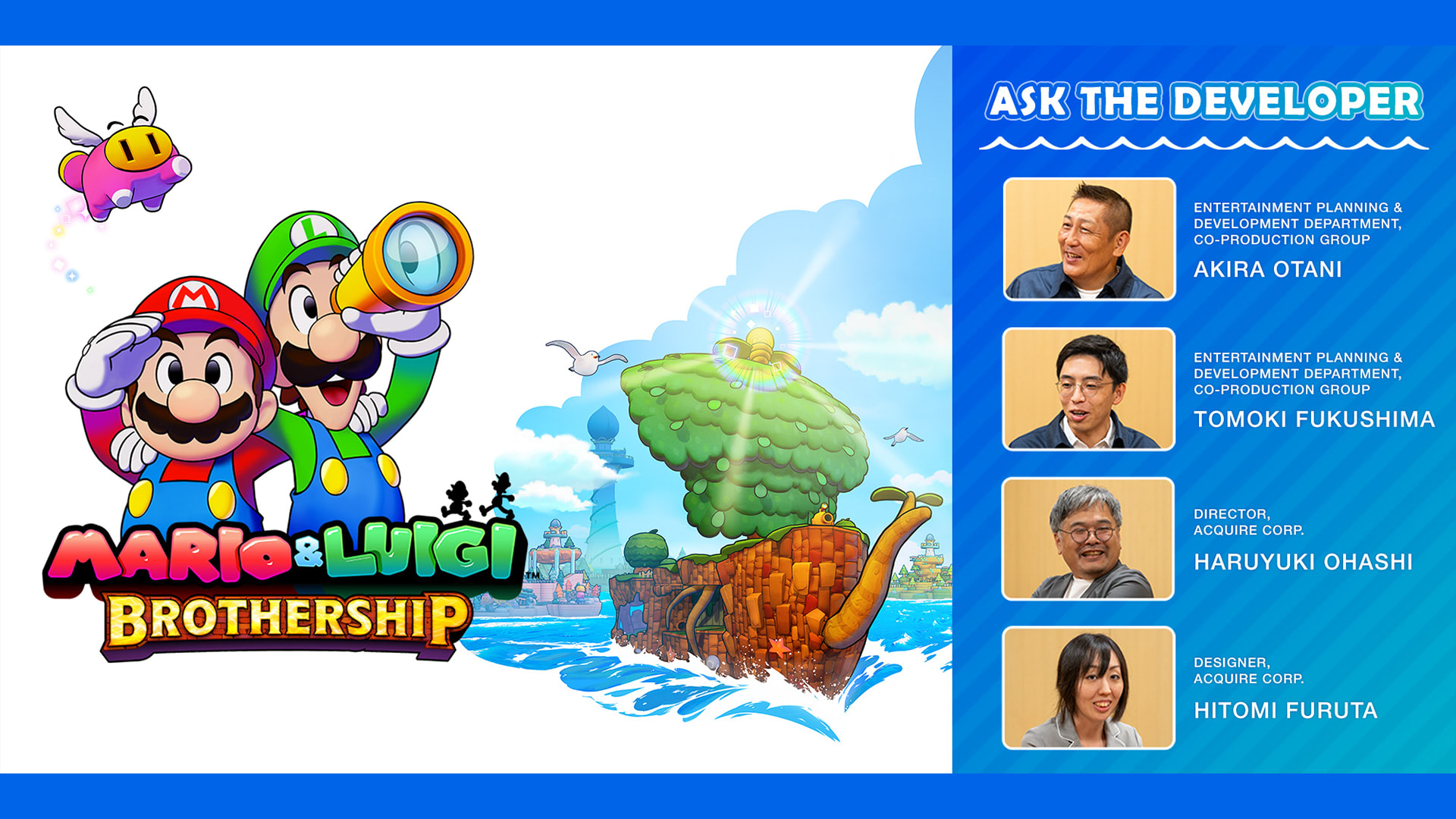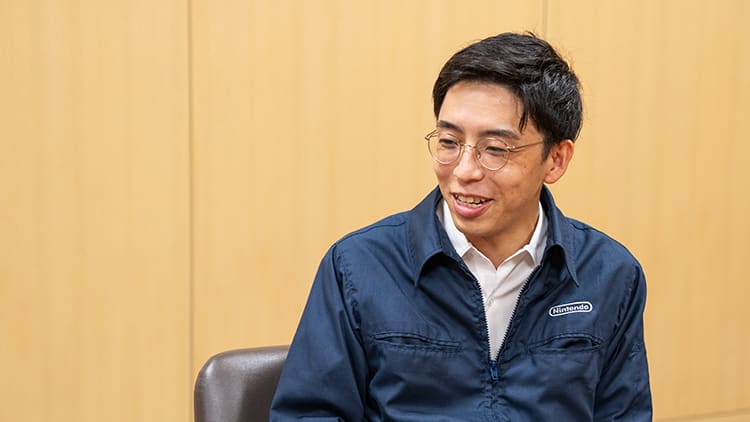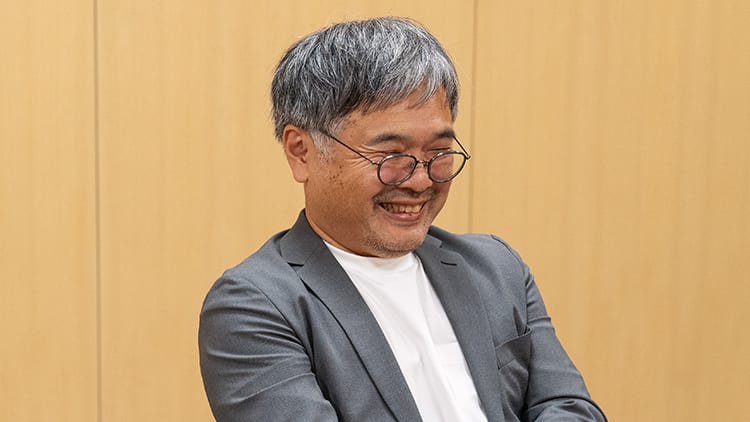Ask the Developer Vol. 15, Mario & Luigi: Brothership – Chapter 3
6 December 2024

This interview was conducted before the game was released.
Some of the images and videos shown in text were created during development.
This article has been translated from the original Japanese content.
Chapter 3: Falling into place with the theme of "connection"
Chapter 3: Falling into place with the theme of "connection"
It seems you spent a long time defining the visuals and setting that are unique to this game, but how did you go about creating the gameplay and story that make up the game's core?
Fukushima:
As for what would become the core gameplay, Acquire's initial idea was really good, so we started by having them prototype it. Here's what was written in the proposal: "A Mario story that's uniquely yours. Living and adventuring on drifting islands."
Ohashi:
I thought drifting islands sounded fun. You discover an island, have an adventure, befriend the people there… I thought it would be fun to connect more and more islands together and increase the number of allies you could go on an adventure with.
Otani:
I have to admit, it was a good idea. Nobody came up with such an idea when we were brainstorming at Nintendo. Gameplay where you connect different islands isn't something you'd come up with normally. (Laughs)
Ohashi:
However, it took us quite some time to capture that previously-mentioned "Mario & Luigi-like" feeling, so the testing for this new element took a back seat… As we discussed how to make this drifting island gameplay fun, it ended up being a while before we could present concrete ideas to Nintendo, and I think that might have worried them.
Otani:
To be honest, I was getting anxious. Fukushima-san and I were wondering when Acquire would be ready to share their ideas with us. (Laughs)
Fukushima:
However, Ohashi-san is the type of person who thinks hard and gives one answer once he's satisfied, so we trusted him in that respect. That said, we did have a lot of internal strategy meetings to discuss how long we could wait. (Laughs)
Ohashi:
In this game, Shipshape Island serves as the base of operations for Mario and his friends' adventure. You drift around the ocean on this island, approaching various other islands and having adventures. But it took a while to complete the game mechanics for this, such as how to have the island travel around this huge ocean.
Fukushima:
The gameplay and story direction are usually decided in a short period of time at the start of development and the details are ironed out from there. But that took longer than expected. Meanwhile, we were working on the battles and actions you can take while exploring without certain things being final. For example, Shipshape Island's drifting system, or the game's scale, such as the number of islands and their themes. It was a bit like chasing rainbows, and it was a lot of work.
Otani:
Also, there was a big difference in the way both companies go about developing games. In previous games in the series, we always created the gameplay first and then came up with a plot that would bring that gameplay to life, so the director led all of the progress. But Acquire's approach to making games was to have the director, Ohashi-san, think about the drifting islands gameplay, while separately from that and in parallel, have an external story writing company come up with the story… However, because it's an RPG, the story and gameplay must work together in unison in order to make any progress.
Ohashi:
The story writing company also struggled to capture that "Mario & Luigi-like" feeling. They couldn't come up with a fitting story.
But eventually you made a breakthrough that solved it, right?
Ohashi:
I think I know when that was. Remember when we were thinking about the plot together and we decided on themes for each sea? The first sea would be "family," the second "friends," and so on.
Fukushima:
You're right, that's when various elements started falling into place with the theme of "connection." The gameplay is about connecting islands, but there are also the connections that exist between the people living on those islands.

Ohashi:
This was around the time that drifting islands were implemented in the game. We started to see how you connected people with each other too as part of the story, and "connection" was gradually established as a theme for this game.
Furuta:
At the time, we thought that fusing together different islands would be a huge undertaking on the system side, requiring a massive amount of data, and therefore might not be possible. So we switched our approach and pivoted towards connecting them with a rope or something similar. We began coming up with lots of different ideas for what rope-like things could be used to connect islands.
One idea was that inserting an electric plug into a socket would create a rope-like connection with electricity running through it, which would cause something good to happen. And with good things happening leading to bonds being formed between people, the idea of "plugging in" mitigated the challenges we faced on both the game mechanic and story fronts… I think that discovery was the turning point.
Fukushima:
As soon as familiar and easy-to-visualise motifs, like electric plugs and cables, were decided on, everyone's understanding aligned, and the process of coming up with ideas for the game that matched the setting became smoother.
Otani:
Before it was a plug, it was a rainbow, wasn't it? (Laughs)
Furuta:
A rainbow bridge, in fact. At first, we connected the islands with bridges. I'm glad we could pivot to something that fit the game better.
Otani:
In the Mario & Luigi series, we always combine gameplay with the game's overall theme in a straightforward way so the game doesn't appear too complicated. Also, since it's a Mario game, we made efforts to ensure the story was clear and understandable. This game's themes are "connection" and "bonds," with the gameplay of connecting the drifting Shipshape Island with other islands and the story of forming bonds between people. Of course, we needed to find a way to communicate these themes clearly to the player.
I see. Indeed, when I played the game myself, I could feel the theme of "connection" coming up consistently all over the place. But it sounds like you went through a lot of trial and error before reaching that point. Speaking of "connection," the main characters, Mario and Luigi, also have a strong bond with each other. How did you go about portraying that?
Otani:
Mario and Luigi working together has always been a key feature of this series, and we wanted to reinforce that further in this game. In previous games, the two of them were a set, and they'd move around together. For example, they'd jump together if you pressed the A and B Buttons.
However, in order to bring something new to the table in this game, we made it so that Luigi moves around autonomously. He'll automatically jump and catch up to you, so I think it's user-friendly. Also, we decided to add gameplay that would allow Luigi to cooperate with Mario in the game world, even if they do get separated. That's a new element in this game – "Luigi Logic."
The game shows the brothers working together to perform actions, no matter how near or far apart they are.
Fukushima:
The feeling of cooperation between Mario and Luigi is emphasised more than ever before. This also applies to the regular attacks in battles, and even when exploring, there are things you can only do because there are two of you, like becoming a ball or a UFO.
This is a series known for embracing anything and everything, and this game includes some moves that are on the quirkier side. I also think the variety of cooperative actions using both characters adds to the strategic possibilities.
The discussion about Mario and Luigi's bond reminds me, I imagine the opening cutscene from the announcement trailer may have made some people think of The Super Mario Bros. Movie. Was the opening cutscene made with that movie in mind?
Otani:
We didn't actually have the movie in mind when we made it. Or rather, when we made it, we didn't have any information about The Super Mario Bros. Movie. I assumed the movie would probably also express the bond between the brothers in some way, but I decided not to worry about how this would be depicted and to just focus on portraying it in the right way for Mario & Luigi… But yeah, I've been told that the opening cutscene bears an uncanny resemblance. (Laughs)
Everyone:
(Laughs)
Ohashi:
I got a shock when I saw the movie. (Laughs)

Furuta:
It felt like they really got us good with it. (Laughs)
Otani:
Just like Snoutlet says in the game, "Some coincidence, huh?"
Ohashi:
To be fair, the movie and the game share the same foundation – this brotherly bond.
Otani:
We were also really happy about the release of The Super Mario Bros. Movie. I'd be really grateful if people who've seen the movie are then motivated to try out games starring Mario and Luigi.
I think more people are familiar with Mario and friends now, after watching the movie. If you already have a good understanding of Mario and Luigi's personalities and their bond before playing this game, you might see it in a different light.
Otani:
That's true. Of course, you can still fully enjoy the game's story even if you haven't seen the movie. In previous Mario & Luigi games, the stories often felt more relaxed, but in this game, it's a little more serious. Especially towards the end of the game, you'll really get a sense of Mario and Luigi's heroism.
Ohashi:
Mario is a representation of the player themselves. I think the more serious and difficult the situation you find yourself in, the greater the joy you'll feel when you overcome it. So I thought we might be able to portray the bond between brothers even more than in previous games. Also, we wanted to make something different from before, with new experiences and attractions.
Challenging yourself to make something new – that's textbook Acquire.
Fukushima:
There was one more thing regarding the story that Ohashi-san was particular about. When you connect lots of other islands to Shipshape Island, which Mario and friends use as a base, the people from those islands gather there, too. So, you feel the island gradually changing and getting more lively.
Ohashi:
That's right. Thanks to Mario and Luigi, or better put, thanks to the player, Shipshape Island grows livelier, and its residents become happier. We wanted players to feel that outcome of their actions. I thought it would be nice to give players the experience of overcoming challenges thanks to a push from the people with whom they formed bonds on the connected islands. I wanted players to feel the joy of being supported by someone and the bonds that are created when everyone helps each other.
Fukushima:
The subtitle for this game is "Brothership." We decided on this after brainstorming over 100 options with Acquire. I think it fits the game's theme perfectly. It refers to their bond of brotherhood, but incorporates the word "ship" from Shipshape Island, which connects the various islands.
Otani:
Until now, the Japanese and English game titles in the Mario & Luigi series have had different names, but for this game, we decided to go with "Brothership" for both.
Fukushima:
It was also well received by our North American and European colleagues because, in English, it also sounds like a play on the word "mothership." It's fair to say that your base, Shipshape Island, is a mothership.